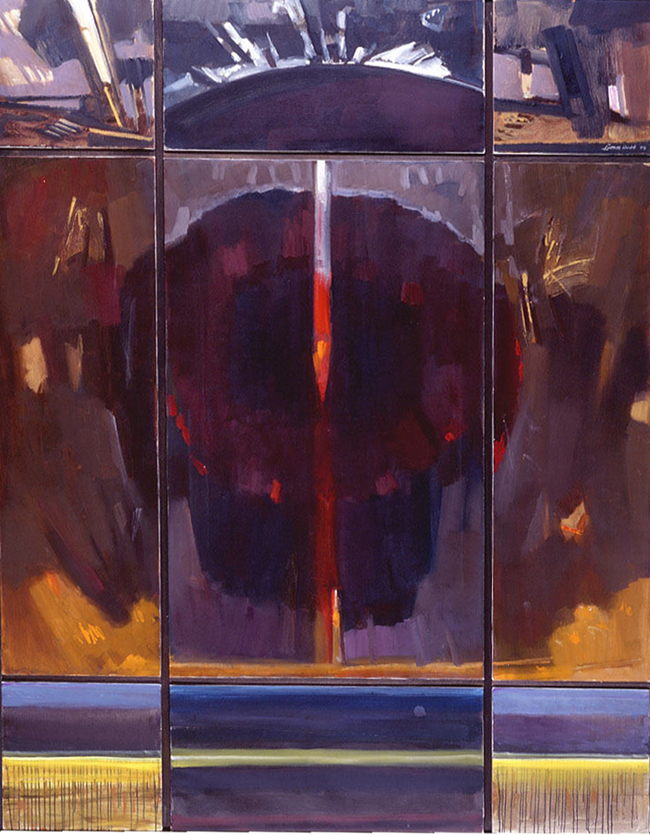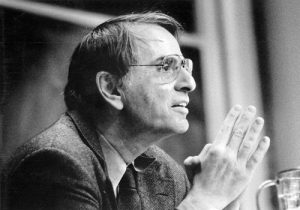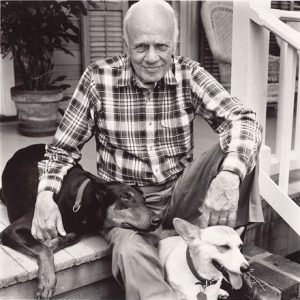by Pedro Blas González (March 2024)

When man stops believing in God, he will believe in anything at all. —G.K. Chesterton
1980: Cosmos
In 1980, the 13-part series Cosmos was aired on the Public Broadcasting Service (PBS). The series was based on the book Cosmos written by Carl Sagan (1934-1996). Sagan was a professor of astrophysics at Cornell University. He said he created the series because he was interested in popularizing science.
 I had entered high school the month before Cosmos aired. I read Cosmos and watched each episode of the series, and re-runs for several years thereafter. I was dazzled with the visual images that the series presented. Sagan was entertaining and instructive, especially his pronunciation of the now famous “billions and billions” of years. I learned a lot from the series, during an impressionable and formative period of my life.
I had entered high school the month before Cosmos aired. I read Cosmos and watched each episode of the series, and re-runs for several years thereafter. I was dazzled with the visual images that the series presented. Sagan was entertaining and instructive, especially his pronunciation of the now famous “billions and billions” of years. I learned a lot from the series, during an impressionable and formative period of my life.
Dating back to my early teens, I had been reading science, and lots of literature and philosophy. I was also formed as a Catholic, which means a healthy respect for the mystery of being, man as a being capable of experiencing the sublime through awe and wonder. In short, Catholicism teaches that the human person is much more than ‘brain,’ the darling of empiricists and gullible rationalists. The latter quickly became a point of contention of the series.
The human person has many avenues of understanding open to it other than just the ‘smartness principle.’ In short, the human person is guided by reason, which guides and nurtures the holistic, well-rounded person.
As much as I enjoyed the series, Cosmos eventually had the opposite effect on me than the series was designed to elicit from the general audience that it was intended for.
Sagan offered a head-spinning array of ‘astronomical’ numbers and distances that, even at my age, I recognized meant nothing for man’s ability to decipher the riddles and paradoxes of space-time. He stressed that “there are maybe 100 billion galaxies and 10 billion trillion stars.” The colossal, mind-bending distances that Sagan reveled in explaining were couched in a mist of mathematical abstractions that ultimately lead to skepticism.

Sagan’s religion of evolution was overwhelming and off-putting. The more I read and re-read the book and watched the series, the greater became my metaphysical and existential concerns, which the book, series, and Sagan gave no importance to, and didn’t even suspect.
Yet I learned much from the series. It introduced me to the music of Bach and Vangelis, ancient Greek pre-Socratic philosophers, the library of Alexandria, Copernicus, Galileo, Kepler and Newton, in addition to other writers and thinkers.
In 1992, I sat before Sagan as he spoke at the Miami Book Fair. By then he was what the French call une célébrite. His talk was about science as the keeper of man’s salvation in the here-and-now and the need for America to do away with its nuclear armament. I smelled a red herring but continued to listen intently. I went home crestfallen. The once secular popularizer of science could not hold back the temptation of becoming a popularizer of ill-informed leftist ideology. At that point I began to understand how once-majestic science was quickly becoming the handmaiden of politically-driven, secular, wealthy donors, government agencies that dispense ‘grant’ money and, most importantly, leftist governments and their technocrats. Sagan was a willing pawn.
Exposing the Religion of ‘Science’
There are glaring, even childish contradictions in Sagan’s books. These contradictions and shortcomings originate in the overreach of a bloated and fanatical conception of science. Though Sagan warns about pseudo-science, it is a logical fallacy to prop up science as man’s salvation in the here-and-now. The danger in this is that a fanatical conception of science eventually turns into scientism: pseudo-science that advocates for ‘change’ and alleged social-justice.
One recurring faux pas that is a favorite of secular scientists and/or proponents of scientism, which they celebrate with sophomoric glee, is the notion that because the universe is immense, man is an insignificant being. How can that be? Even teenagers will ask: how can an insignificant being be capable of suspecting the grandeur and vastness of the universe?
According to proponents of man-as-an-insignificant-being, man (especially scientists), is the only being capable of understanding the vastness of the universe. Which of the two is it? They forget that science, philosophy, literature, religious sentiment and art are products of this insignificant being. This contradiction is compounded by the notion that the universe is wonderful, vast and a super-structure that can only be comprehended by the IQ (the smartness principle), though, not genuine intelligence, of astro-physicists and their army of PhDs.
Sagan’s cadre of people who breathe the air of the smartness principle are adamant that knowledge is the purview of science, not philosophers, and the intuition and a priori sensibility that is cultivated by thoughtful, intellectually honest thinkers. The wonders of the universe definitely cannot be grasped by Christians, we are told.
Sagan gloats:
For myself, I like a universe that includes much that is unknown and, at the same time, much that is knowable. A universe in which everything is known would be static and dull, as boring as the heaven of some weak-minded theologians. A universe that is unknowable is no fit place for a thinking being.
There is laughable irony in the assertion of the worst secular scientists and promoters of scientism that ‘science will solve all of man’s problems and assuage our existential concerns.’ This is science as the nanny that holds the hands of people who live in fear due to a lack of understanding that comes from lack of proper scientific education. This conception of science does not understand broader, metaphysical and existential questions—the mystery and sublimity of Being, for instance. That is, the philosophical question: why is there something rather than nothing?
Walker Percy Exposes Carl Sagan as Naive
 Walker Percy’s tongue in cheek, mock self-help book Lost in the Cosmos: The Last Self-Help Book is a philosophical work of genius. The book was published in 1983, the heyday of Sagan’s scientific/activist guru status. A book like Lost in the Cosmos is a rare occasion in postmodernity, an era when encountering intelligence in literature and philosophy is a sorry spectacle.
Walker Percy’s tongue in cheek, mock self-help book Lost in the Cosmos: The Last Self-Help Book is a philosophical work of genius. The book was published in 1983, the heyday of Sagan’s scientific/activist guru status. A book like Lost in the Cosmos is a rare occasion in postmodernity, an era when encountering intelligence in literature and philosophy is a sorry spectacle.
Lost in the Cosmos is a cautionary tale about the annihilation of the self in postmodernity. What happens to people who do not cultivate, others who do not even suspect that the self is the foundation of free will and self-identity?
Percy (who is a trained MD, Catholic philosopher and novelist) reminds readers that scientists do not suspect that to understand objective reality and the constants of nature, there must exist a subject capable of thought, self-reflection and intelligent enough to locate the essence of its discoveries—scientific or otherwise—in the context of self-aware human persons:
The science of the scientist can understand the world but not itself. The science of the scientist can understand everything in the Cosmos but the self of the scientist. It, the self, is therefore, a ‘spiritual’ entity, if you like, but an entity anyhow subject to its own modes of existence, triumphs, and disasters and, in this age, its own peculiar predicaments.
This is why discussion of Carl Sagan comes into play in Lost in the Cosmos. Percy says so in a chapter entitled ‘A Space odyssey’: “This chapter, as well as other parts of the books owes a good deal to Carl Sagan’s splendid picture book, Cosmos. I hope he will not take offense at some fanciful extrapolations therefrom. Sagan’s book gave me much pleasure, a pleasure which was not diminished (perhaps was even increased) by Sagan’s unmalicious, even innocent, scientism, the likes of which I have not encountered since the standard bull sessions of high school and college—up to but not past the sophomore year.”
Percy rightfully points out that the history of Western scientific thought covered in Cosmos leaves out Christian intellectual history. Sagan jumps from Ionian pre-Socratic philosophers to the rise of modern science—Francis Bacon’s Novum Organum. Percy: “The natural philosophers of Latin Christendom in the thirteenth and fourteenth centuries created the experimental science characteristic of modern times.”

It was not until the 1800s that the word ‘science’ acquired the standard usage of the scientific method. Instead, natural philosophy, philosophia naturalis, the study of nature (Greek word, physis) included physics, biology, chemistry, zoology and anthropology.
Percy argues that Sagan’s insistence in the possibility of intelligent life in the cosmos, “this in spite of the fact that there is no evidence that life exists anywhere else in the cosmos, let alone intelligent life,” signals scientism’s need to dethrone man as the only being capable of self-reflection, as far as we know: “Once everything in the Cosmos, including man, is reduced to the sphere of immanence, matter in interaction, there is no one left to talk to except other transcending intelligences from other worlds.”
Locating scientism’s desire to dethrone man from the hierarchy of being, circa 2024, Percy’s words resonate with the urging of transhumanism for Artificial General Intelligence (AGI) to create humanoids that replace man.
One offense that scientism makes against the human person’s embrace and cultivation of awe and wonder in regard to transcendence is that it reduces everything to a scientific formula. Scientism is vulgar reductionism. I leave readers to consider Percy’s own words on this topic:
…while the scientific method may be officially neutral toward God, scientism, an attitude which extrapolates from the objectivity of the scientific method to an all-constructing transcending objectivism, cannot be neutral. There is no room in the Cosmos for an absolutely transcending objective mind and an absolutely transcending God.”
Table of Contents
Pedro Blas González is Professor of Philosophy in Florida. He earned his doctoral degree in Philosophy at DePaul University in 1995. Dr. González has published extensively on leading Spanish philosophers, such as Ortega y Gasset and Unamuno. His books have included Unamuno: A Lyrical Essay, Ortega’s ‘Revolt of the Masses’ and the Triumph of the New Man, Fragments: Essays in Subjectivity, Individuality and Autonomy and Human Existence as Radical Reality: Ortega’s Philosophy of Subjectivity. He also published a translation and introduction of José Ortega y Gasset’s last work to appear in English, “Medio siglo de Filosofia” (1951) in Philosophy Today Vol. 42 Issue 2 (Summer 1998). His most recent book is Philosophical Perspective on Cinema.
Follow NER on Twitter @NERIconoclast
- Like
- Digg
- Tumblr
- VKontakte
- Buffer
- Love This
- Odnoklassniki
- Meneame
- Blogger
- Amazon
- Yahoo Mail
- Gmail
- AOL
- Newsvine
- HackerNews
- Evernote
- MySpace
- Mail.ru
- Viadeo
- Line
- Comments
- SMS
- Viber
- Telegram
- Subscribe
- Facebook Messenger
- Kakao
- LiveJournal
- Yammer
- Edgar
- Fintel
- Mix
- Instapaper
- Copy Link







3 Responses
As a teenager, I read all of Sagan’s writings, watched his programs and even selected my university because of his presence there, spending some class time in his department.
He may have been politically naïve and uninterested in Christian dogma, but there was little in the way of science there to explore. His motivation, if I understand it correctly, was to discover the meaning of existence, solve its fundamental riddles, by means of an examination of the behavior of matter.
Carl Sagan was a sensationally gifted science explainer and popularizer, who encouraged adoption of the scientific method and skepticism, a method of inquiry which has benefited my life very greatly. His search for meaningfulness did not lead him to any sense of confidence or comfort, in my opinion, as I recall Science as a Candle in the Dark, written during his final, awful illness. The flame was burning low and his discoveries were perhaps, if I remember the sad sentiment in which much of the book was written, not the consolation he sought.
Many people confuse science with reductionism. Reductionism is the chief ally of scientific materialists, along with naturalism. However there are serious limits to reductionism such as in inquiries into the origins of life, the universe and consciousness. In his area of consciousness research with psychedelics, clinicians and researchers encounter many phenomena that scientific materialism rejects as impossible. Stanislav Grof describes in his book “When The Impossible Happens” an encounter with Carl Sagan. Grof is a giant in his field, and was invited by Sagan to meet up at a hotel room where Sagan complained that the phenomena that Grof was reporting was dangerous to people, who didn’t understand science the way Sagan thought they should — and was worried they could be misled. Instead of me describing the meeting, here is the story from groff himself: https://www.youtube.com/watch?v=-iQ2DjTPLdE
Indeed, it is not an insignificant being that entertains awe.